|
1 Strond Street
Dover
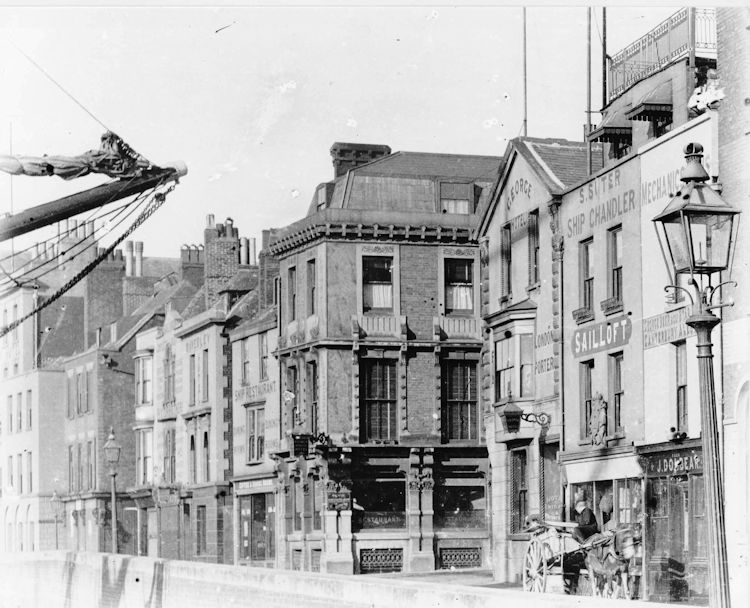
Above photo, date unknown. "Mechanics
Arms" right, "George Hotel" next
left, "Prince Imperial"
central. |
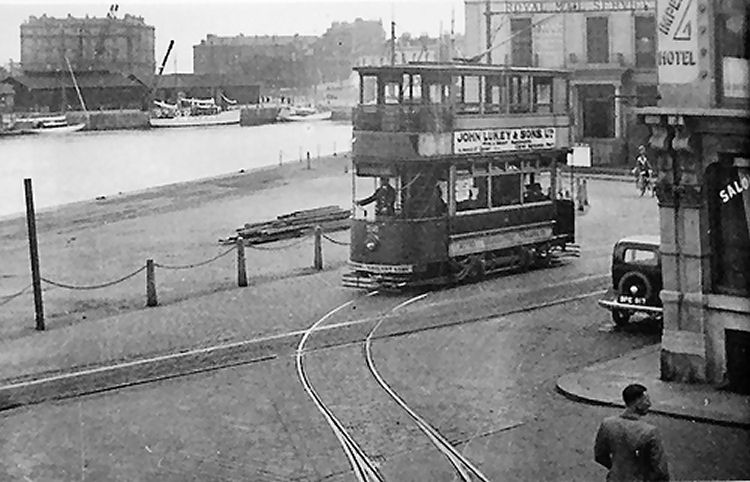
To the right of the picture can be seen the Prince Imperial Hotel. |
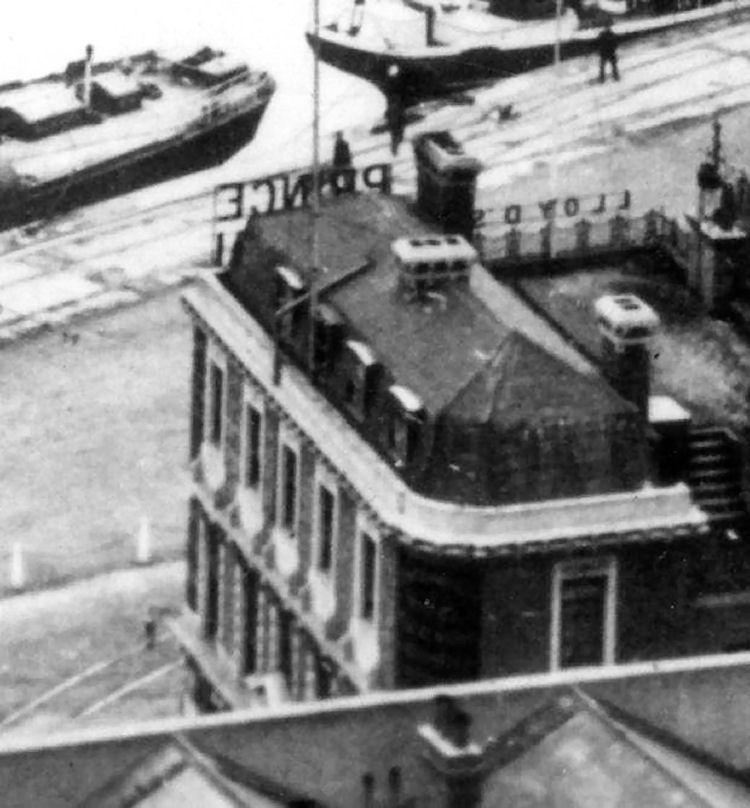
Above photo, date unknown, kindly sent by Paul Wells. |
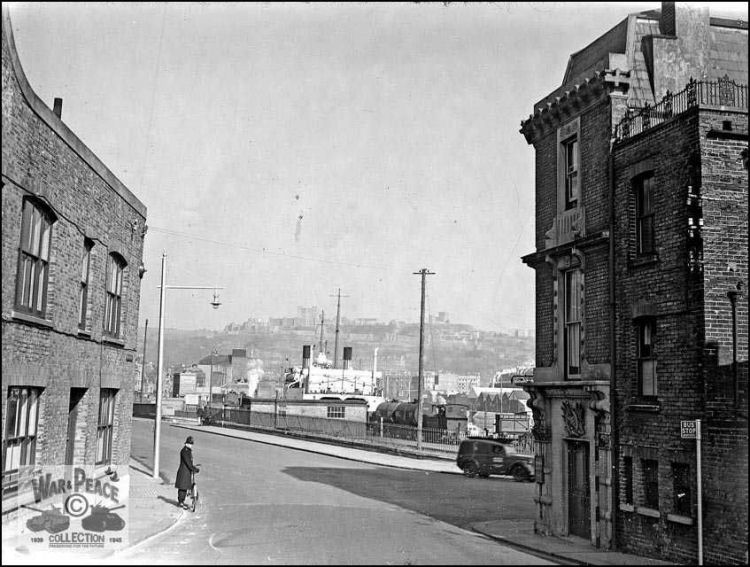
Above photo, circa 1950, kindly sent by Roger of
www.kentphotoarchive.com |
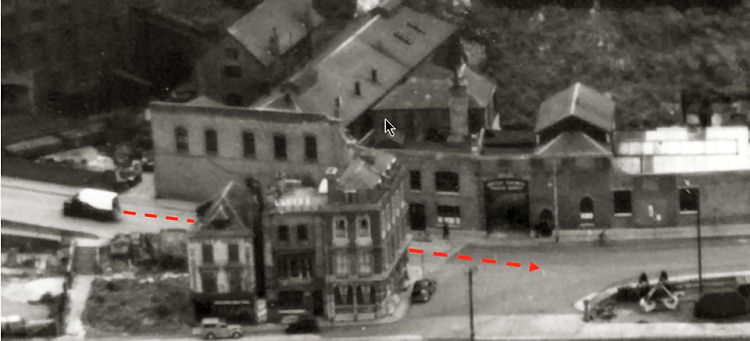
Above image, date unknown showing the direction the photo above was
taken from. Kindly sent by Glenn Hatfield. The picture also shows the
Packet Yard in the background. |
|
From the Dover Express, 7 December 1951.
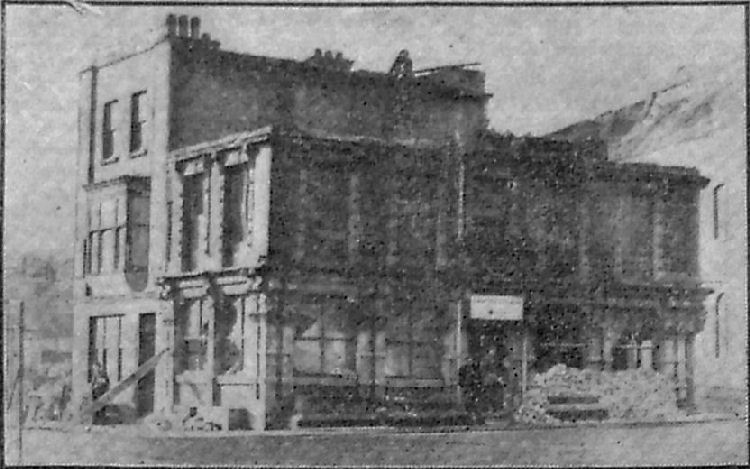
Contractors are now engaged on demolishing the "Prince Imperial" Hotel,
at the junction of Strond Street and Limekiln Street, near the Packet
Yard. Eventually, Strond Street will be closed and become part of the
enclosed dockyard. |
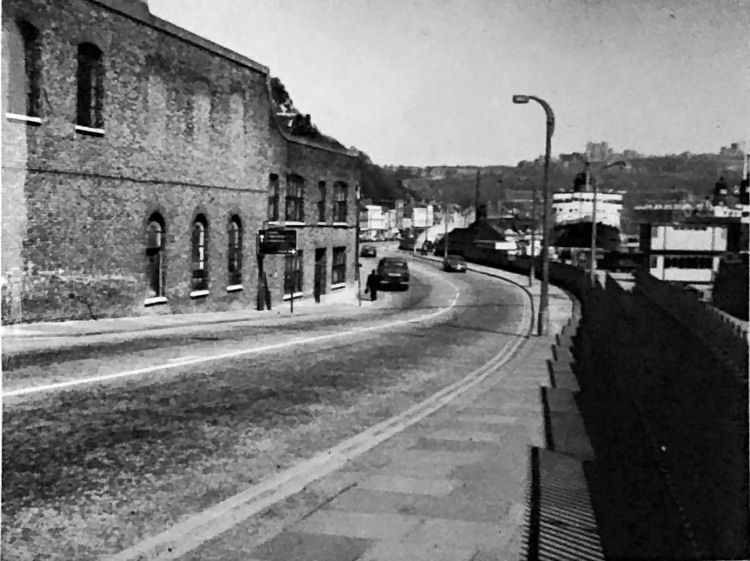
Above photo showing the same location as the top photo, 1972, from the J
E Gilham collection, kindly sent by Glenn Hatfield. |
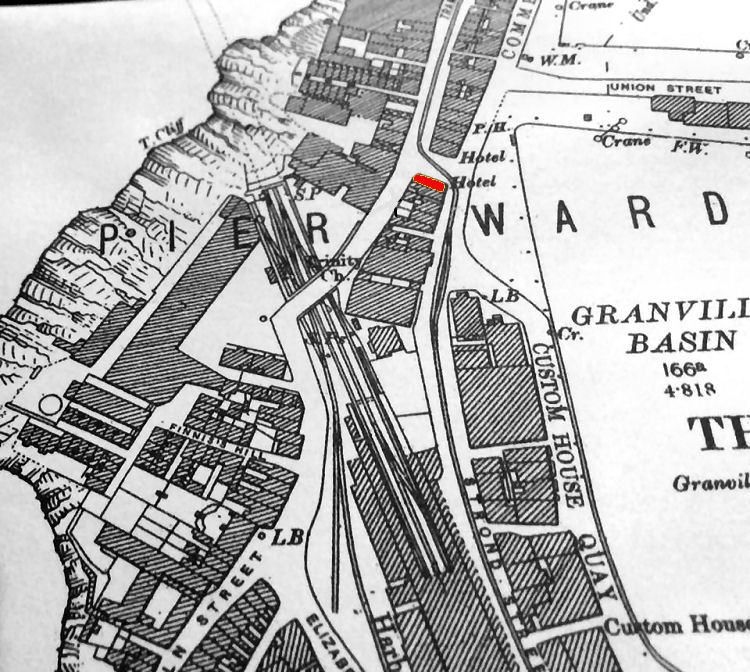
Above map 1897. Kindly sent by James Moore. Hotel shown in red. |
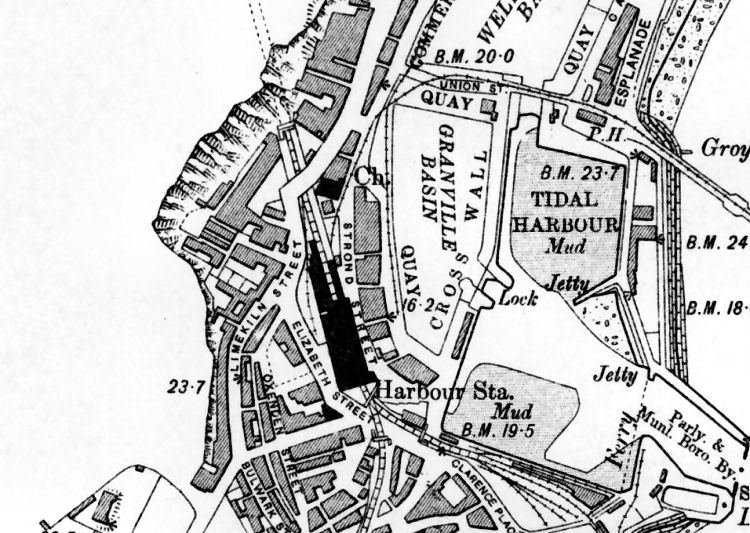
Above map showing Strond Street and Limekiln Street 1908. |
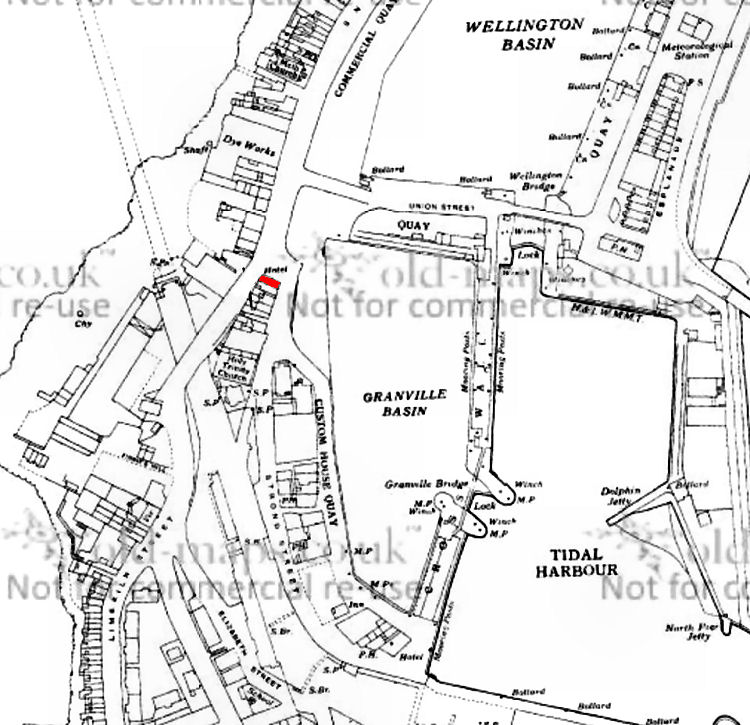
Above map 1937. Kindly sent by James Moore. Hotel shown in red. |
Positioned at the juncture with Limekiln Street, with the Royal
Victualling Yard at one time occupying the quay in front of the hotel. A new
licence went to Conradi in 1864. He also received another in 1869 when it
was described as a new and elegant building. An advertisement of 1881
claimed that it was the prettiest bar in the County of Kent. The statement
does not seem to have been challenged.
Identified in the census of 1891 and addressed at 3 Strond Street stood
another hotel, full name unfortunately as yet unknown, but this was a
Temperance Hotel and a Joseph Simmons age 59 was the proprietor.
|
From the Dover Express and East Kent News, Friday, 19 November, 1869.
SUSPECT
Frederick Knowles, a young man, was charged with loitering in Snargate
Street, on the previous night, for the purpose, it was supposed, of
committing a felony, the prisoner being unable to give a satisfactory
account of himself.
Police-constable Pilcher said he saw the prisoner loitering about near
the “Prince Imperial Hotel,” Snargate Street, on the previous night, at
half-past ten. He supposed him to be there for an unlawful purpose, and
as he refused to allow himself to be searched, he took him to the
station-house.
The prisoner, in defence, said he had no intention of doing anything
wrong. He had been to Shorncliffe Camp to try and enlist for a soldier;
but not having succeeded, he was on his way to his lodgings when he was
stopped by the constable. He was not loitering about, but was walking
along, and the constable followed him from the “Apollonian Hall” to the
place where he stopped him, when he said something about a knife which
he thought prisoner had. The prisoner complained that the police were
continually stopping him, and searching him in the public thoroughfare.
He thought they had no right to do so, and he therefore on this occasion
refused to be searched; but he told the constable that he would go with
him to the station-house, and be searched there. He had been before the
Bench previously on a charge of suspicion, but had not been convicted.
The police had informed him a few days ago, when he had no shoes on his
feet, that if he did not get a pair, they would lock him up, and they
were continually threatening him.
In reply to the Bench, the Superintendent said that the prisoner was
frequently seen with thieves and strangers in the town, and that he had
been convicted; but prisoner denied both accusations, and said he tried
to get an honest living in the town and neighbourhood; but as soon as he
obtained anything to do, he was hunted out of the place by the police.
As the prisoner promised to leave the town, the Magistrates discharged
him, but directed Police-constable Pilcher to see him away.
|
|
From the Dover Express and East Kent News, Friday, 25 November, 1870.
AN ABUSIVE FLYDRIVER
Alfred Southwood, the driver of a hackney carriage No. 28, was summoned
for using abusive language, while plying for hire, contrary to the
bye-law, on the 9th November.
On being asked by the Mayor whether he was guilty or not guilty of the
charge, the defendant, after some hesitation, said that he thought,
perhaps, he was guilty.
The Town Clerk, who appeared in support of the information, said the
Local Board were indebted to Mr. Erskine for coming forward to prosecute
in this case. [The Hon. Mr. Erskine was present, and occupied a seat
upon the Bench.] It appeared that Mr. Erskine arrived at Dover by the
London, Chatham, and Dover Railway, shortly before six o'clock, on the
evening of Wednesday, the 9th inst. He engaged the defendant's fly, in
which he was driven to the “Imperial Hotel.” Mr. Erskine was alone, and
he had only two pieces of baggage; but on arriving at the hotel the
defendant charged him half-a-crown. Believing that this must be an
exorbitant fare, he appealed to the porter of the hotel, who informed
him that the fare could not be more than eight-pence. Strictly speaking
the fare was only 1s. Mr. Erskine offered the defendant 1s. 6d.; but
defendant thereupon became very abusive, and made use of foul language,
and it was for this language, and not for the overcharge, that the
summons was taken out.
Mr. Knocker then called the porter at the “Imperial Hotel,” who deposed
to the facts which had been stated; but he said that the defendant was
the worse for liquor, and gave it as his opinion that if he had not been
he would not have conducted himself in this manner.
The defendant's employer had been summoned to produce the defendant's
license, in order that it might be endorsed; but he said that he had
searched for it everywhere and was unable to find it.
In reply to the Mayor, the defendant's employer said that he had been in
his service “this time” for about ten months. He had employed him,
however, on two previous occasions; and altogether he had been in his
service for about six years. During that time he had left his employ
twice; but on both occasions he did so to better himself, and not for
misbehaviour. He believed the defendant had his license when he came
back to his employ the last time; and he was able to say that it did not
bear any endorsement.
Superintendent Coram, in reply to the Magistrates, said the defendant
had been summoned before for breaking the bye-laws, though he did not
recollect the exact nature of the offence.
The Mayor told the defendant that he must apply to the Town Clerk for a
new license, upon which an endorsement of this conviction would appear,
and that he must not drive again till he obtained it. His Worship then
said that the Bench reiterated the thanks which had already been
expressed by the Town Clerk on behalf of the Local Board to the Hon. Mr.
Erskine, for taking the pains to bring this offence under the notice of
the authorities. The defendant would be fined 8s. and 12s. costs; and in
default of payment he would be imprisoned for fourteen days.
The defendant said he had no money; but his employer said he would pay
the fine on his behalf.
|
|
From the Dover Express and East Kent Intelligencer,
16 August, 1872. Price 1d.
BEGGING
George Jones was charged by Police-sergeant Stevens with begging in
Limekilm Street.
Stevens deposed to seeing he prisoner beg in Limekiln Street on the
previous evening, and also in the "Prince Imperial Hotel," where he
asked relief both of the barmaid and some gentlemen in the bar.
Defendant denied begging when taken into custody, and said he had been
in the "Prince Imperial" for some beer.
It appeared that 2s. 4d., in coppers, had been found on defendant's
person at the station-house.
Prisoner was discharged on promising to quit the town.
|
|
From the Dover Express and East Kent Intelligencer,
26 January, 1877. Price 1d.
DRUNK AND DISORDERLY
John White, navvy, was charged with being drunk and disorderly in
Snargate Street.
Police-constable Baker said he was on duty in Snargate Street about
quarter-past six the preceding evening, when he was called to the
"Prince Imperial Hotel." Prisoner was there, drunk and disorderly, and
the landlady told him to leave the house but he refused to go. Witness
put him out and he obstructed the foot-path and created a disturbance.
he then took him into custody and at the station he became very violent.
Prisoner said he did not recollect anything about it. he was willing
to go back to his work again.
The Bench fined him 1s.
|
|
From the Dover Express and East Kent Intelligencer, 17 March, 1882. Price 1d.
ADVERT
The Prettiest Bar in the County of Kent. – One of the sights of Dover is
the Bar of the “Prince Imperial.”
|
|
From the Canterbury Journal, Kentish Times and Farmers' Gazette, 12 July 1884.
THE HOTEL SWINDLERS.
At the Police Court, on Friday Morgan Vaughan, whose escape from the
Police station and recapture on Wednesday caused so much excitement in
the town, was brought up on remand charged with obtaining food and
lodgings under false pretences from the "Harp," "Imperial," and "Priory"
Hotels. Mr. Mowll, who prosecuted, said Captain Millar, proprietor of the
"Harp," had been paid what was due to him by prisoner's friends, and
that the case therefore fell through. In In the other cases prisoner had
not brought himself within the law as there was no evidence of false
pretences. Mr. Stilwell to the magistrates:- After that I question whether you have
a right to adjudicate. Mr. Stein (to the prisoner); Under the
circumstances the case must be
dismissed. Mr. Mills haring accepted payment has left us no alternative
but to dismiss you. We very much regret it as we consider you deserve
severe punishment. Prisoner then left the Court; his dismissal evidently being unexpected
by the large number of persons assembled. |
|
From the Dover Express and East Kent News, Friday, 12 March, 1886. Price 1d.
TRESPASSING ON THE PRINCE IMPERIAL
Alfred Phipps, 14, and Alfred Lilo, 13, were charged with being on the
enclosed premises of the “Prince Imperial Hotel,” Liverpool Street, for
an unlawful purpose, and doing damage to the same.
Mr. Vernon Knocker appeared to prosecute, and stated that a considerable
amount of damage had been done to the “Imperial Hotel” by boys. It was
the wish of the owners that the place should be kept as tidy as
possible.
Police-constable Bath said: On Tuesday, about 3.30 in the afternoon, I
saw four boys and a little girl in the grounds of the “Imperial Hotel.”
They were walking towards the back part of the premises. I watched about
ten minutes and they all came out. They were dragging some wood. They
loaded one boy up and made their way towards Liverpool Street. The older
boy Phipps stopped and broke one of the panes of glass in the basement
with his foot. I then got into a buss whish was going down Liverpool
Street and when near the defendants got out. The younger defendant
dropped the candlestick produced in the road. I then found a new pipe in
his pocket. I then took them to the Police Station. The elder boy
admitted breaking the window.
As the charge was not pressed the Bench thoroughly cautioned the
defendants, and dismissed them.
|
|
From the Dover Express and East Kent News, Friday, 27 April, 1900. Price 1d.
CAPTURED UNDER THE BED
John Sullivan was charged with being found in the “Prince Imperial
Hotel,” in Strond Street with the purpose of committing a felony. He was
charged with stealing six Belgian coins and a flask of whisky.
Joseph Wood, landlord of the “Prince Imperial,” Strond Street, said that
on Friday afternoon he saw the six Belgian coins produced and the metal
flask full of Scotch whisky in the drawer of the dressing table of his
bedroom. On Saturday evening about nine o'clock the barmaid said a man
had gone upstairs. Witness went upstairs on to the first floor, but did
not see anyone. He, however, heard someone on the floor above, and then
sent for the Police. Meanwhile, with a customer, he went up to the 2nd
floor. Before discovering anything the Policeman joined them. They
looked through two rooms, and then went up on to the top story and into
the barmaid's bedroom. Under the bed they found the prisoner. The door
was open, but there was no light. The Constable asked him to come out,
and he did so. The Constable asked him what he was there for. He said,
“To rob of course, what do you think? It is no use making a fuss about
it, there are too many. I will go quietly.” He said to witness, “Did you
see me come upstairs?” Witness said, “You were both seen and heard.” On
coming down he asked for a drink. Afterwards at the Police Station
witness identified the coins and the flask, which were found on the
prisoner when he was searched. Afterwards he found that the prisoner had
broken open a drawer in the bedroom.
Police Constable Husk said that on Saturday evening about 4.45 he was
called to the “Prince Imperial Hotel.” They found the prisoner as
already detailed.
The prisoner was sent to Canterbury for 6 weeks' hard labour.
|
|
From the Dover Express and East Kent News, Friday, 1 January, 1904. Price 1d.
EXTENSION
An extension of time was granted to Mr. Gartner, of the “Prince Imperial
Hotel,” Strond Street, on the occasion of a supper to the Hotel Chefs of
Folkestone and Dover on 31st December. The supper will not take place
till eleven o'clock, and the extension was to 1.30.
|
|
From the Dover Express and East Kent News, Friday, 7
October, 1904. Price 1d.
LICENCE TRANSFER
The licence of the "Prince Imperial Hotel" was temporarily
transferred from Mr. Gartner to H. Wormleighton, on the application of
Mr. Mowll. The applicant had kept an hotel at Ostend, and a certificate
from the Belgian Police was handed in.
|
|
From the Dover Express and East Kent News. 25 March 1910.
A RETIRED LICENSED VICTUALLER'S FAILURE. ASSETS NIL
The statement of affairs in the failure of Robert Arthur Egan, of the
"Prince Imperial Hotel," Strond Street, Dover, retired licensed
victualler, shows liberties of £459 3. 5d., and assets nil. The cause of
failure as stated by the debtor is: "Losses through bad trade whilst
carrying on business as a licensed victualler at Aston."
The Official Receiver's observations are as follows: The receiving
order was made on the petition of the debtor, who was adjudged bankrupt
the same day on his own application. The debtor (aged 38 years) states
he commenced business between eight and nine years ago as a licensed
victualler, when he purchased the leasehold premises, known as the
"Prince of Wales Hotel," Church Road, Aston, Middlesex, for a sum of
£11,000 subject to a then existing mortgage of £10,000. The mortgage was
apparently content with his security, and the debtor merely paid over
£1000 to the vendor, £600 of which was his own money, £400 having been
lent him by a firm of distillers, without security, at interest of 5 per
cent. The purchase price included 35 years unexpired term of the lease,
furniture, stock in trade etc. The debtor alleges that the business was
successful for some years; that he regularly paid the interest on the
mortgage, in addition to discharging the load of £400 before referred
to, and his trade accounts as they became due. He states, however, that
during the last two or three years he was at those premises his takings
considerably decreased owing to the closing up of a passage adjoining
his premises, and to new roads being made, in consequence of which his
usual customers went to other houses. Furthermore, he alleges, he lost
several customers owing to the fact that a number of hand laundries in
that district were converted into steam laundries and low labour
employed. As a result he became in arrear in the payment of his
accounts, and states that the mortgages subsequently foreboded and took
possession of his premises. The valuation of his stock and furniture
amounted to about £135, which, after payment, of preferential claims,
left him a balance of only £10, although he admits he had other trade
liabilities amounting to upwards of £400. Apparently he left Acton about
a year ago, since which time he contends he has merely acted as an
assistant at an hotel in Dover. The debtor did not keep an accurate
record of his receipts and payments, but admits he discovered his
insolvency about two years prior to discontinuing his business. All the
liabilities scheduled in the statement of affairs are alleged to be
debts incurred whilst the debtor carried on business at the "Prince of
Wales Hotel," Acton.
|
|
From the Dover Express and East Kent News. 13 January 1939.
Mr A. K. Mowll applied for approval to plans showing proposed
alterations to the sanitary arrangements at the "Prince Imperial".
Mr. Mowll said that the alteration was made at the suggestion of the
Chief Constable, and would be a great improvement.
The plans were approved.
|
War damage had closed the hotel previous to 1945 but following repair
post war it reopened in January 1946. The doors closed finally at the
termination of its lease in September 1950. Demolition followed in November
1951 and the licence was suspended. Mackeson.
LICENSEE LIST
CONRADI George Norris 1864-98 (age 59 in 1881 ) )
   
WOOD Joseph 1898-1904
  
 GARDINER/GARTNER Charles to Oct/1904 dec'd
GARDINER/GARTNER Charles to Oct/1904 dec'd

WORMLEIGHTON Harry Oct/1904-05 end

WARNE William George 1905-Aug/08

BOSFORD 1908?
VOSPER Harry O'Donaghue Aug/1908-09 end

EGAN Robert Arthur 1909-Dec/10

 HOOPER Alfred George Dec/1910-14 end
HOOPER Alfred George Dec/1910-14 end
FORSYTHE Edward P 1914-20

HUNTER Frederick G 1920-Oct/23
 
 JOB Mrs Agnes Mary Oct/1923-38+
JOB Mrs Agnes Mary Oct/1923-38+
   
MOWLL A K Mr 1939+
RAWLINGS Reginald Price 1946
ENNIS Mrs A S 1946-50+
 
 From the Post Office Directory 1874 From the Post Office Directory 1874
 From the Post Office Directory 1882 From the Post Office Directory 1882
 From Pikes Dover Blue Book 1889 From Pikes Dover Blue Book 1889
 From Pikes Dover Blue Book 1895 From Pikes Dover Blue Book 1895
 From the Kelly's Directory 1899 From the Kelly's Directory 1899
 From the Post Office Directory 1901 From the Post Office Directory 1901
 From Pikes Dover Blue Book 1923 From Pikes Dover Blue Book 1923
 From Pikes Dover Blue Book 1924 From Pikes Dover Blue Book 1924
 From Pikes Dover Blue Book 1932-33 From Pikes Dover Blue Book 1932-33
 From Pikes Dover Blue Book 1938-39 From Pikes Dover Blue Book 1938-39
 From Pikes Dover Blue Book 1948-49 From Pikes Dover Blue Book 1948-49
 From the Kelly's Directory 1950 From the Kelly's Directory 1950
 Census Census
|









